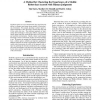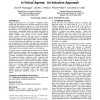65 search results - page 10 / 13 » Closing the Affective Loop in Intelligent Learning Environme... |
120
Voted
ECAI
2006
Springer
15 years 3 months ago
2006
Springer
This work presents some anticipatory mechanisms in an agent architecture, modeling affective behaviours as effects of surprise. Through experiment discussion, the advantages of bec...
AAAI
2000
15 years 24 days ago
2000
If robotic agents are to act autonomously they must have the ability to construct and reason about models of their physical environment. For example, planning to achieve goals req...
FLAIRS
2003
15 years 25 days ago
2003
The detection of attacks against computer networks is becoming a harder problem to solve in the field of network security. The dexterity of the attackers, the developing technolog...
CHI
2000
ACM
15 years 3 months ago
2000
ACM
We can reliably build “second generation” intelligent computer tutors that are approximately half as effective as human tutors. This paper evaluates two interface enhancements...
107
click to vote
ATAL
2008
Springer
15 years 1 months ago
2008
Springer
Humans continuously assess one another's situational context, modify their own affective state, and then respond based on these outcomes through empathetic expression. Virtua...



